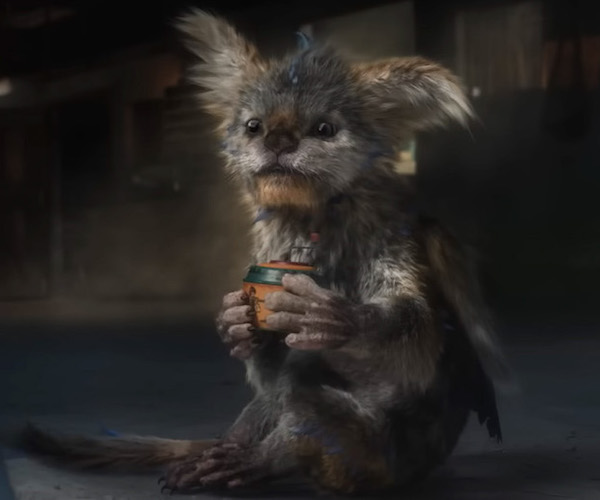Television Review: “Chupa” — An Adorable Little Monster
By Sarah Osman
What makes Chupa stand out from similar films is that, at its heart, it is a testament to embracing your heritage.

The eponymous chupacabra in the Netflix film.
I’ve always been fascinated with chupacabras, “goat sucker” in English. Lurking at night throughout the Americas, these are terrifying, fantastical creatures who attack livestock and then drink the animals’ blood. Depending on the region, the physical looks of a chupacabra varies. Since I grew up in southern California, and then spent much of my young adulthood in New Mexico, I’m familiar with a chupacabra who has dog-like features. They’re usually hairless, with spikes from their back, wild eyes, sharp fangs, and claws. Given that this visual has been imprinted in my mind, I was stunned to see the cuddly, wide-eyed chupacabra in Netflix’s Chupa.
A mixture of a rabbit, griffin, and cat (with a bit of koala thrown in for good measure), this baby chupacabra shares nothing in common with the traditional legend. Chupa takes place in Steven Spielberg territory, spinning a variation on E.T. in which a child and his family are tasked with saving an adorable creature and reuniting it with its family. Be warned: for adults, Chupa may not be all that thrilling an adventure. Unless they’re charmed by its nostalgic beats (I was). Of course, Chupa wasn’t made for adults, a fact that seems to have confused many reviewers. It’s an idyllic family film, the kind that harkens back to a time long before the domination of social media — the ’90s.
It’s fitting that Chupa takes place in that era. The period is currently being romanticized, until it becomes clear, once memories are scrutinized, that it was not always as great as we remember. For children of immigrants, like Alex, the ’90s were not all that high-flying. Alex (Evan Whitten) is the only Mexican kid at his school in Kansas City. He’s miserable there. Among his many woes: a white kid bullies him for his lunch. On top of that, Alex isn’t into celebrating his Mexican heritage, so he is depressed when he has to go visit his late father’s family in Mexico, especially without his mom acting as translator.
Alex meets his abuelo (Demian Bichir), who immediately tries to wrestle him, an act that makes more sense once Alex discovers his grandfather had been a famous luchador. He then meets his cousins, Ninja Turtle lover and luchador fanatic Memo (Nickolas Verdugo), and his Beastie Boys-loving older cousin Luna (Ashley Ciarra). Alex’s compatriots get a kick out of messing with his near-total lack of knowledge of Mexico, but deep down they’re eager to welcome him to his family’s homeland. Watching the three kids interact is one of the most delightful parts of Chupa, a heartwarming retread of the three children who take care of E.T.
One night, to Alex’s amazement, he discovers a chupa in his abuelo’s barn. Except that this chupa is not a vampiric monster. This chupa is adorable: you’ll want to pick him up and snuggle him. He titters, scampers, and needs help learning how to fly. The poor little guy is desperate to be reunited with his mama, a sentiment that Alex relates to because he longs for his father. The creature’s desire for reunion is an apt metaphor for grief, which serves as a surprisingly poignant undercurrent in a children’s film.
In addition to being reunited with its mother, the chupa also needs protection from a nefarious scientist, played by Christian Slater, who appears to relish playing an over-the-top villain. It’s not exactly clear what organization Slater works for or what he wants to do with the chupa. But it’s not good. The family bands together — even abuelo the luchador gets to show off his moves — to save the creature.
What makes Chupa stand out from similar films is that, at its heart, it is a testament to embracing your heritage. The E.T. copycat films of the ’80s and ’90s predominantly revolved around white children in the suburbs. As the child of an Egyptian immigrant who grew up in a diverse neighborhood, I never saw kids who looked like me and my friends. Chupa dramatizes tensions that are very familiar to those of us with parents from another country: feeling torn between two cultures, unsure of how to fit in, and desperately wanting to be “normal.” By spending time with his family and learning about Mexican culture, Alex embraces who he truly is, a useful message for both kids and adults at a time that the enemies of America’s immigrants are far from mythical.
Sarah Mina Osman is a writer residing in Wilmington, NC. In addition to writing for the Arts Fuse, she has written for Watercooler HQ, Huffington Post, HelloGiggles, Young Hollywood, and Matador Network, among other sites. Her work was included in the anthology Fury: Women’s Lived Experiences in the Trump Era. She is currently a first year fiction MFA candidate at the University of North Carolina Wilmington. When she’s not writing, she’s dancing, watching movies, traveling, or eating. She has a deep appreciation for sloths and tacos. You can keep up with her on Twitter and Instagram: @SarahMinaOsman
Tagged: children's film, Chupa, Mexican culture, Mexico, Monster
